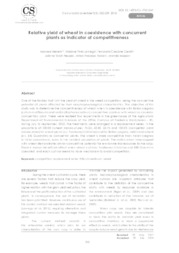Relative yield of wheat in coexistence with concurrent plants as indicator of competitiveness.
Relative yield of wheat in coexistence with concurrent plants as indicator of competitiveness.
Author(s): REINEHR, M.; LAMEGO, F. P.; CARATTI, F. C.; PERUZZO, S. T.; FABIANI, M. F.; MAZZON, M.
Summary: One of the factors that limit the yield of wheat is the weed competition, being the competitive potential of plants affected by their morphophysiological characteristics. The objective of this study was to determine the competitiveness of wheat when in coexistence with Italian ryegrass (Lolium multiflorum) and radish (Raphanus sativus) competitive plants or with wheat as simulator competition plant. There were realized four experiments in the greenhouse of the Agricultural Department of Environmental Sciences of the UFSM, Campus of Frederico Westphalen ? RS, during July to September, 2012. The treatments were arranged in a replacement series, in the proportions of 100:00 (wheat monoculture), 75:25, 50:50, 25:75 and 100:00 (competitor plant monoculture) for wheat plants (cv. Fundacep Cristalino) and for Italian ryegrass, radish and wheat (cv. BRS Guamirim) as competitor plants. The wheat is more competitive than Italian ryegrass in initial coexistence, even in the smallest proportion of plants. The radish when intercropped with wheat demonstrates similar competitive potential for environmental resources to the crop. There is mutual beneficial effect when wheat cultivars Fundacep Cristalino and BRS Guamirim coexisted, and each cultivar seems to have mechanism to avoid competition.
Publication year: 2018
Types of publication: Journal article
Keywords: Competição de Variedade, Erva Daninha, Trigo, Triticum Aestivum
Observation
Some of Embrapa's publications are published as ePub files. To read them, use or download one of the following free software options to your computer or mobile device. Android: Google Play Books; IOS: iBooks; Windows and Linux: Calibre.
Access other publications
Access the Agricultural Research Database (BDPA) to consult Embrapa's full library collection and records.
Visit Embrapa Bookstore to purchase books and other publications sold by Embrapa.

